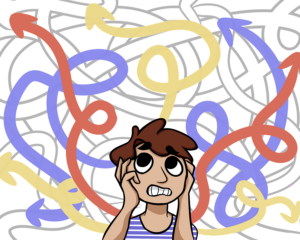As High School seniors prepare to graduate, many will choose something about computers for their job or continued studies. Here’s a great overview from an Ask a Tech Teacher contributor of what one of those fields–working with the powerful algorithms that drive search and research–is about:
What are search engine algorithms?
For many students who are approaching school leaving age, they will already have decided the career path which they wish to take. Not surprisingly, given the role it plays in our everyday lives, many choose to pursue a career in IT. Of course, this is an incredibly broad topic. Still, in this article, we will focus predominantly on aspects relating to websites, moreover, how they can help to achieve business goals and other objectives.
As an international school in Hong Kong, we do all we can to prepare our students for going out into the workplace. Our various IT classes cover a wide range of topics with web development, e-commerce and SEO all being covered to some degree. Indeed, it is three areas, which are all interlinked, where most students wish to work, understanding the professional opportunities that are likely to present themselves. However, for a website to fulfil its potential, it must satisfy the needs of search engine algorithms.
What is an algorithm?
Algorithms are not a new phenomenon and have been used as a part of mathematics for thousands of years. They are often mistaken for being a formula but are in actual fact a series of different formulas or ingredients. They are often likened to preparing a meal for a large group. However, the meals may essentially be the same; different people like it to be cooked differently. Some people might want their meat cooked rare while others like it well done, some like salt, some like pepper, and so on. The algorithm means that a different formula is required for each person.
Algorithms and search engines
All websites will contain the same basic “ingredients”. They will have a URL, some content, internal and external links, some images and a loading speed. Each of these ingredients can be classed as a formula so an algorithm can use countless formula to give the user the results that they want on the SERP (Search Engine Results Page). Each of the different formulae will have a different “weighting” so, if we take Google’s “core” algorithm, it is a culmination of several algorithms which are designed to give the results that the users are looking for.
Google uses a series of different algorithms which are frequently updated including Panda and Penguin, although at this stage never are irrelevant. The various algorithms filter search results by rewarding quality content, authoritative links and keywords, so the most relevant results are displayed first. They try to put the search query into context and therefore also try to understand the intent behind the question (something we will cover later). The objective is to enhance the users’ experience.
What role do “entities” play?
To make this more relevant, Google defines an “entity” as:
“A thing or concept that is singular, unique, well-defined and distinguishable.”
To go back to the meal analogy, if we have a dinner party, six entities attend. The six entities combined make another entity, and all the ingredients in the meal make up another, so Google’s world is made up of series of entities but giving them all the same weighting has benefits for search engines. It could make judgements about the different entities interconnectedness, something that may not be possible if they were treated as “people” or “things”. As Google ranks billions of websites, it must have a straightforward way of applying a ranking system, and one which can be displayed in milliseconds.
Why entities are essential to web designers and SEO experts
Understanding how Google operates is essential as this is how you will get higher rankings on the SERPs. Making sure that Google understands the correlation between entities is crucial, and this is where programming, keywords and internal and external links all play a role. Google will know whether a landing page is relevant or not and is incredibly difficult to manipulate – a problem with SERPS results in the past.
Google will send crawlers through websites, mapping their content, often finding ways that entities are related. It means that the search engines can learn to predict specific relationships between entities and give them a weighting accordingly. As an SEO expert or website designer, your role is to make the make as easy as possible, providing accurate directions throughout the crawlers’ journey.
OK, we accept that this is complicated, so here are some of the key points that will make the information above seem more relevant.
- The context Core algorithms are just a series of small algorithms and formulas, so if an algorithm is updated, it is probably just a tiny element of an incredibly large jigsaw. Appreciating how any adjustments fit into the bigger picture is the main factor. Although the rules concerning the interconnectedness of entities may have changed slightly, it is vital that your road map still gives the right directions otherwise you won’t arrive at your destination (first page of SERPs).
- Understanding entities is crucial
All entities have an algorithm of their own to some degree, and the role of entities will increase in forthcoming years as Google looks to improve the user’s experience. It means that the content on your site is incredibly valuable, but likewise, the links between external sites and landing pages are vital as it provides a map for crawlers to follow. This will help when Google in formulating the SERP for the user.
- User intent
Google is always trying to provide the best set of search results for its users, so the algorithms are continually be updated to help achieve this. The algorithm will monitor a vast number of different results and disregarded those that it doesn’t feel match the user’s intent. This involves putting the search query into the context that the user intends. The results are determined by giving the entities a page relevance rating and again, understand how they are related to other entities.
Conclusion
Search engines are designed to enhance a users experience and give them the SERPs that are relevant to them. They are complex, but to meet their intentions and to simplify things, you have to understand what the user needs and put yourself in their shoes.
More on coding
4 Unplugged Activities for Hour of Code
Why Should Students Learn Computer Science? A Teacher’s Perspective
Jacqui Murray has been teaching K-18 technology for 30 years. She is the editor/author of over a hundred tech ed resources including a K-12 technology curriculum, K-8 keyboard curriculum, K-8 Digital Citizenship curriculum. She is an adjunct professor in tech ed, Master Teacher, webmaster for four blogs, an Amazon Vine Voice, CSTA presentation reviewer, freelance journalist on tech ed topics, contributor to NEA Today, and author of the tech thrillers, To Hunt a Sub and Twenty-four Days. You can find her resources at Structured Learning.





































